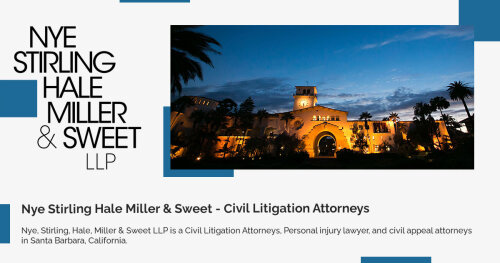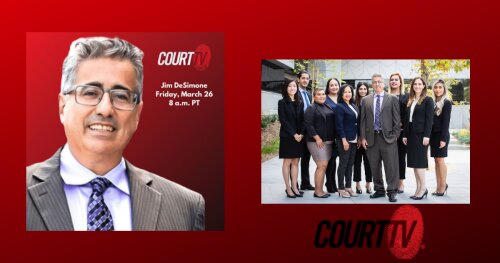Best Sexual Harassment Lawyers in California
Share your needs with us, get contacted by law firms.
Free. Takes 2 min.
Or refine your search by selecting a city:
List of the best lawyers in California, United States
About Sexual Harassment Law in California, United States
Sexual harassment is a form of unlawful discrimination that is prohibited in California workplaces and many other settings. California law provides some of the strongest protections in the United States, safeguarding employees, students, tenants, and others from unwanted sexual advances, requests for sexual favors, and other verbal or physical conduct of a sexual nature. These laws aim to create environments where individuals can work, study, or live without fear of harassment or retaliation for asserting their rights.
Why You May Need a Lawyer
People seek legal assistance with sexual harassment issues for many reasons. You may need a lawyer if you have experienced unwelcome conduct of a sexual nature at work, school, or in another setting where you have legal rights. Common situations include feeling pressured for dates or sexual favors, being subjected to sexual jokes or comments, encountering offensive images or materials, or facing retaliation after reporting harassment. Legal help is also valuable if you need to understand your rights, gather evidence, file complaints, negotiate with your employer or school, or pursue a lawsuit for damages due to harassment or retaliation.
Local Laws Overview
California law provides broader protections than federal law regarding sexual harassment. The Fair Employment and Housing Act (FEHA) prohibits sexual harassment in workplaces regardless of the size of the employer and covers interns, volunteers, and independent contractors in addition to employees. Harassment can be physical, verbal, or visual and does not have to be motivated by sexual desire. Both men and women can be victims or perpetrators, and harassment can occur between people of the same or different genders. California law also requires employers to provide anti-harassment training and to have clear policies for reporting and addressing complaints. Retaliation for reporting harassment or participating in an investigation is strictly illegal.
Frequently Asked Questions
What is considered sexual harassment in California?
Sexual harassment is unwelcome conduct based on sex, gender, or sexual orientation. This can include unwanted touching, suggestive comments, sexual jokes, displaying offensive images, or making employment or academic decisions based on a person's response to sexual advances.
Who is protected by California sexual harassment laws?
Employees, job applicants, interns, volunteers, independent contractors, students, tenants, and other persons are generally protected under California's laws against sexual harassment.
What should I do if I am harassed at work or school?
Document incidents of harassment, save evidence such as messages or emails, and report the conduct to your supervisor, human resources, Title IX coordinator, or another designated authority as soon as possible.
Can I be fired or punished for reporting sexual harassment?
No, retaliation for reporting sexual harassment or participating in an investigation is illegal under California law. If you experience retaliation, you may have additional legal claims.
How long do I have to file a claim?
As of 2020, you have up to three years from the date of the harassment to file a complaint with the California Civil Rights Department. Prompt action is recommended for the best results.
What can a lawyer do for me in a sexual harassment case?
A lawyer can help evaluate your situation, explain your rights, gather evidence, file complaints, negotiate settlements, and represent you in court or administrative proceedings.
Does the harassment have to come from my boss to be illegal?
No, harassment can come from coworkers, supervisors, clients, customers, or even non-employees in some cases. Employers are still required to protect you.
Am I protected if I am an independent contractor or volunteer?
Yes, California's laws protect independent contractors and volunteers as well as employees.
What kind of compensation can I receive if I win my case?
You may be entitled to lost wages, emotional distress damages, punitive damages, reinstatement if terminated, and reimbursement of attorney fees and costs.
Do all employers have to provide anti-harassment training?
Most California employers with five or more employees must provide sexual harassment prevention training to all employees, including supervisors and managers.
Additional Resources
Several state and national agencies and organizations can offer guidance and support, including:
- California Civil Rights Department (CRD, formerly DFEH) - Handles complaints and investigations related to sexual harassment and discrimination.
- Equal Employment Opportunity Commission (EEOC) - Federal agency that enforces workplace harassment laws.
- California Department of Industrial Relations - Provides information about workplace rights.
- Victim advocacy groups such as California Coalition Against Sexual Assault (CALCASA) - Offers education and victim support services.
- Legal aid organizations and local bar associations - Can help connect individuals with qualified attorneys and free resources.
Next Steps
If you believe you have experienced sexual harassment, your first step is to document the incidents as thoroughly as possible, including dates, times, locations, and details about what occurred. Report the harassment through the appropriate internal procedure at your workplace, school, or housing provider. If the issue is not resolved or if you feel unsafe, seek guidance from the California Civil Rights Department or another listed resource. Contact an experienced employment or civil rights attorney to review your case, discuss your legal options, and determine the best way to proceed. Do not wait to take action, as your rights are protected under California law, and time limits apply for most legal claims.
Lawzana helps you find the best lawyers and law firms in California through a curated and pre-screened list of qualified legal professionals. Our platform offers rankings and detailed profiles of attorneys and law firms, allowing you to compare based on practice areas, including Sexual Harassment, experience, and client feedback.
Each profile includes a description of the firm's areas of practice, client reviews, team members and partners, year of establishment, spoken languages, office locations, contact information, social media presence, and any published articles or resources. Most firms on our platform speak English and are experienced in both local and international legal matters.
Get a quote from top-rated law firms in California, United States — quickly, securely, and without unnecessary hassle.
Disclaimer:
The information provided on this page is for general informational purposes only and does not constitute legal advice. While we strive to ensure the accuracy and relevance of the content, legal information may change over time, and interpretations of the law can vary. You should always consult with a qualified legal professional for advice specific to your situation.
We disclaim all liability for actions taken or not taken based on the content of this page. If you believe any information is incorrect or outdated, please contact us, and we will review and update it where appropriate.
Browse sexual harassment law firms by city in California
Refine your search by selecting a city.















